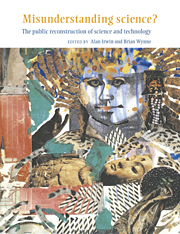Book contents
- Frontmatter
- Contents
- Acknowledgements
- Introduction
- 1 Misunderstood misunderstandings: social identities and public uptake of science
- 2 Science and Hell's kitchen: the local understanding of hazard issues
- 3 Disembodied knowledge? Making sense of medical science
- 4 Now you see it, now you don't: mediating science and managing uncertainty in reproductive medicine
- 5 Ignoring science: discourses of ignorance in the public understanding of science
- 6 Insiders and outsiders: identifying experts on home ground
- 7 Authorising science: public understanding of science in museums
- 8 Nature's advocates: putting science to work in environmental organisations
- 9 Proteins, plants, and currents: rediscovering science in Britain
- Conclusions
- Notes on contributors
- Select bibliography
- Index
8 - Nature's advocates: putting science to work in environmental organisations
Published online by Cambridge University Press: 16 October 2009
- Frontmatter
- Contents
- Acknowledgements
- Introduction
- 1 Misunderstood misunderstandings: social identities and public uptake of science
- 2 Science and Hell's kitchen: the local understanding of hazard issues
- 3 Disembodied knowledge? Making sense of medical science
- 4 Now you see it, now you don't: mediating science and managing uncertainty in reproductive medicine
- 5 Ignoring science: discourses of ignorance in the public understanding of science
- 6 Insiders and outsiders: identifying experts on home ground
- 7 Authorising science: public understanding of science in museums
- 8 Nature's advocates: putting science to work in environmental organisations
- 9 Proteins, plants, and currents: rediscovering science in Britain
- Conclusions
- Notes on contributors
- Select bibliography
- Index
Summary
Environmentalism and the public's understanding of science
Since the late 1980s Britain has experienced a rapid rise in popular and media interest in environmental matters. The level of public concern with green issues seemed poised to reach truly unrivalled heights in 1989 when, in elections for the European Parliament, the UK Green Party received nearly 15% of the poll. The tendency to choose Green soon deserted the British voting public, but not before it had made a strong impact on the other mainstream parties who quickly began to emphasise their own environmental credentials.
Greening has been apparent elsewhere in society too. Advertisers have plundered he environment's comic resources, with puns about ‘greenness’ achieving wide currency and with jokes around environmental themes being employed to sell all manner of goods, from ‘lid free’ cars (convertibles) to ‘nose-zone friendly’ deodorants. Sports commentators have shown equal flexibility in weaving accounts of climate change into their remarks about unseasonably warm football matches as well as rain-affected cricket fixtures. Environmental thrillers have once again begun to populate television schedules and, for the late 1990s, Hollywood looks set to offer numerous environmental spectaculars, particularly on rainforest themes. Given all these trends, one can only assume that the public is increasingly familiar with certain aspects of environmentalism, and that such topics as acid rain, the ozone layer, and the greenhouse effect have attained daily currency. The penetration of these terms into everyday culture is, I suggest, indicated by a 1992 poster campaign in the UK for Regal cigarettes featuring a character (Reg) supposedly giving his views about topical issues, the joke (at least in many cases) being that he misconstrues his theme.
- Type
- Chapter
- Information
- Misunderstanding Science?The Public Reconstruction of Science and Technology, pp. 172 - 190Publisher: Cambridge University PressPrint publication year: 1996
- 24
- Cited by

